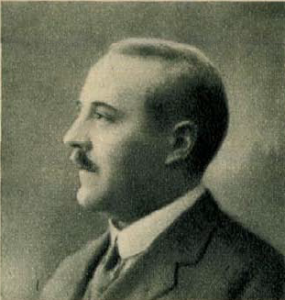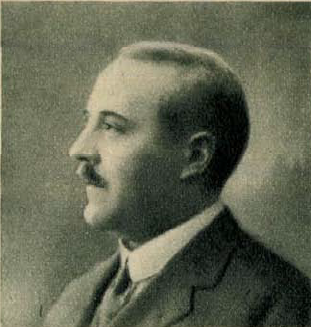Ferenc Marschall
Ferenc Marschall (Timisoara, 2 October 1887 - Budapest, 23 January 1970) agricultural politician, Minister of Agriculture, seventh President of the Budapest Commodity and Stock Exchange.
His life
He completed his secondary education at the Piarist High School in Timisoara. He received a doctorate in law and political science from the University of Budapest.
Professional activity
In 1905 he was one of the founders of the Orsz. Széchenyi Association. He was the political columnist of the Hungarian State newspaper (1905-07), a contributor to the Association and the Review of Hungarian Farmers. After a study trip to Western Europe, he directed the organization of cooperatives in the Hungarian Farmers' Association until 1911, then he was an official in the Ministry of Agriculture. After World War I, he was agricultural lecturer to the Central Committee for Disarmament in Vienna (1918).
He was editor-in-charge of the Village (1920 - 31) and editor-in-charge of the Agricultural Gazette (1928 - 44).
First Budapest Steam Mill Rt.
In 1943 he was the managing president of the First Budapest Steam Mill Ltd.
Budapest Commodity and Stock Exchange
Between 1943 and 1944 he was the seventh President of the Budapest Commodity and Stock Exchange. He was responsible for the fact that, unlike in the First World War, the Exchange remained open during the Second World War. Although trading ceased on Saturdays from 6 March 1943, it continued until 13 December 1944, when Budapest was besieged.
Public activities
After the overthrow of the Soviet Republic, he held high state posts, first as presidential adviser to the Minister of Agriculture (1919-20), then as director of the Village Association (1920-23), and deputy director of the National Chamber of Agriculture (1923-24). On the list of the Christian, Smallholder, Farmer and Citizen Party, then of the Party of National Unity, he was a member of the National Assembly (1922 - 26) and of the National Assembly (1926 - 39) for the district of Jánosholm. Member of the Presidential Council of the Hungarian Economic Research Institute.
The breeding of the West-Hungarian Agricultural Cooperative of Tura
The reconstituted Darányi government
Gazdanap in Kiskunhalas
Works by
- Count István Széchenyi and the Hungarian middle class (Budapest, 1909)
- The Care of the Village (Budapest, 1921)
- Social Thought and Reality (Budapest, 1942).
Sources
- Hungarian Biographical Encyclopedia 3, supplementary volume A-Z (1981). p. 508.

Born: 1887.10.02.
Place of birth: Timisoara
Date of death: 1970.01.23.
Place of death: Budapest
Occupation: agricultural politician
Parents:
Spouses:
Children:
Author: by Radnai Márton
Ferenc Marschall
Ferenc Marschall (Timisoara, 2 October 1887 - Budapest, 23 January 1970) agricultural politician, Minister of Agriculture, seventh President of the Budapest Commodity and Stock Exchange.
His life
He completed his secondary education at the Piarist High School in Timisoara. He received a doctorate in law and political science from the University of Budapest.
Professional activity
In 1905 he was one of the founders of the Orsz. Széchenyi Association. He was the political columnist of the Hungarian State newspaper (1905-07), a contributor to the Association and the Review of Hungarian Farmers. After a study trip to Western Europe, he directed the organization of cooperatives in the Hungarian Farmers' Association until 1911, then he was an official in the Ministry of Agriculture. After World War I, he was agricultural lecturer to the Central Committee for Disarmament in Vienna (1918).
He was editor-in-charge of the Village (1920 - 31) and editor-in-charge of the Agricultural Gazette (1928 - 44).
First Budapest Steam Mill Rt.
In 1943 he was the managing president of the First Budapest Steam Mill Ltd.
Budapest Commodity and Stock Exchange
Between 1943 and 1944 he was the seventh President of the Budapest Commodity and Stock Exchange. He was responsible for the fact that, unlike in the First World War, the Exchange remained open during the Second World War. Although trading ceased on Saturdays from 6 March 1943, it continued until 13 December 1944, when Budapest was besieged.
Public activities
After the overthrow of the Soviet Republic, he held high state posts, first as presidential adviser to the Minister of Agriculture (1919-20), then as director of the Village Association (1920-23), and deputy director of the National Chamber of Agriculture (1923-24). On the list of the Christian, Smallholder, Farmer and Citizen Party, then of the Party of National Unity, he was a member of the National Assembly (1922 - 26) and of the National Assembly (1926 - 39) for the district of Jánosholm. Member of the Presidential Council of the Hungarian Economic Research Institute.
The breeding of the West-Hungarian Agricultural Cooperative of Tura
The reconstituted Darányi government
Gazdanap in Kiskunhalas
Works by
- Count István Széchenyi and the Hungarian middle class (Budapest, 1909)
- The Care of the Village (Budapest, 1921)
- Social Thought and Reality (Budapest, 1942).
Sources
- Hungarian Biographical Encyclopedia 3, supplementary volume A-Z (1981). p. 508.
